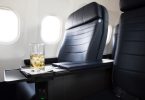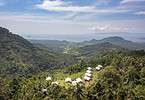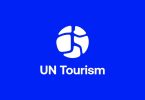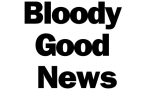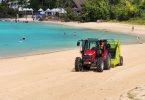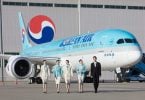At the request of the Ministry of Trade and Industry, Feneta gave the Namibia tourism industry an overview of sector performance in 2009 in the wake of the deepening global economic crisis. All of their conclusions are in general terms looking at all sub-sectors of the industry, accommodation, professional hunting, tour operations, car hire, tourism activities operators, tour guide bookings, and travel/booking agents.
There is no doubt that the constant global news of job losses, losses to retirement funds, losses on the stock exchanges around the world, losses to big corporations and banks needing billions in bailouts has made the world leisure travel market nervous in all market segments. A holiday is a luxury. In hard times, luxuries are usually the first to be cut to save on expenses.
That said, Namibia does not expect a slump or depression in their tourism sector, but they do expect a decrease in the steady five-year growth that the tourism sector has been experiencing, both in tourism product demand and in annual arrivals figures.
The tourism industry boom is over, but the industry is neither pessimistic nor fatalistic about 2009 given the current favorable exchange rates, lower fuel rates, and lower interest prime rates. Many tourism operations secure deposits and confirmed bookings (some are fully pre-paid) 6-12 months in advance; this means that some may have a substantial number of regular clients from wholesalers with whom they have existing business relationships, already confirmed for the 2009 peak season. It is still relatively early in 2009 and many clients could likely book later this year due to the uncertainty.
As of now, there are no mass cancellations in the tourism sector, in fact, the upper end/higher-end market has reported a few operators with a slight increase over last year’s bookings. Namibian tour bus operators are already seeing declines in advance bookings for trips in 2009. These currently look like they will be down by 15-20 percent.
Professional hunters reports slower sales at the recent trade fairs. There were mixed reports with some outfits booking the normal level of hunts and others stating that their bookings were down as much as 20 percent. Some hunters are predicting a 3 percent decline in growth for 2009, with some foreign hunters postponing their Namibian hunts to 2010 to ‘wait-and-see’ before they commit.
The car hire industry does not project mass losses or job reductions. Many of the larger car hire companies provide most of the available rental vehicles in Namibia. These are usually booked to business clients and, at this time do not show major fluctuations in advance bookings (comparing this year to 2007). Those renting vehicles primarily to overseas self-driving leisure tourism clients may have a significant decline in revenues in 2009.
Tourism arrivals to Namibia in 2007 were up 11 percent over 2006. 2006 arrivals were 7.1 percent up over 2005. Overall arrivals for 2008 are expected to turn out to show an increase in arrivals of only between 3-5 percent (this is difficult to predict accurately as the first half of 2008 was showing a larger increase, with the second half of 2008, showing drop-offs of up to 25 percent), with 2009 projected to have increased arrivals of possibly 0-2 percent and some predictions are showing a 2 percent decrease in arrivals in 2009.
Fenata expects that the leisure and business tourists that do come could chose to be more cautious. They may stay for a shorter period of time, reduce the number of activities they book while here, stay in a 3–star facility rather than a 5 star, buy less souvenirs and reduce impromptu spending, fly economy rather than business class, or other cost-saving choices.
Fenata believes that tourism (demand growth) in 2009 in Namibia could likely be in line with international expected rates, 0-2 percent, down from 7 percent in 2008 (UNWTO, January 2009), on average.
They are confident that there will likely be no mass job cuts in the tourism industry in 2009. However, the rate of new job creation will slow; the extent will be difficult to quantify in order to make an accurate projection. Some in the industry, who usually hire temporary or seasonal employees, may not do this at all or in the same amounts, nor at the same time as before, particularly if clients are confirming bookings late.
Investment in the tourism industry, i.e., new lodge constructions, renovations, expansions, or new vehicle purchases for tour operations, etc.., will be down significantly in 2009. The amount of beds available in Namibia increased in 2008 over 2007 between 8-9 percent. This will reduce significantly in 2009 (to possibly a 0-3 percent increase in numbers of beds available). The industry will become more cautious about initiating new capital projects and wait to see confirmed bookings for 2009 before building new rooms, hiring new employees, buying new tour vehicles, or expanding office or other facilities.
In 2007, over 250,000 South Africans arrived in Namibia as tourists. The global crisis has hit South Africa to some degree, and there will be a negative impact on outbound tourists. However, on the whole, Fenata feels this will not be to the extent that it will cause a slump in demand from SA. In Namibia, the South African Rand can be equally spent without converting to a hard currency at the existing unfavorable exchange rates. Wealthier south Africans who still intend to take some kind of holiday, and who could have taken holidays in Europe or North America, may well decide to holiday in the region in 2009 to save money.
Fenata believes that Namibians will continue to travel around the country in 2009. 33 percent of all bed nights in May, 2008 were sold to Namibians. This trend of domestic tourism may increase as Namibians who take leisure holidays, also cut back on any overseas travel (due to the exchange rates) and may chose to travel within the country in the off-peak season where packages for domestic tourists are readily available.
In light of this information, Fenata recommended the following to the industry. They asked the industry to consider that now is not the time to invest in any new ventures without a serious re-think about projected market share and market exposure for that particular enterprise during a flat tourism growth year.
The tourism industry should focus on value-for-money pricing strategies and package deals for tour operators with advance advertising so that wholesalers abroad can advertise and sell them in time. But the industry should avoid price-slashing wars with each other. They should also avoid raising prices to attract the overseas clients (given the exchange rates) for mid-market products to the detriment of regional/local tourists. In the end, such pricing strategies are usually short-sighted, largely unsustainable and can lead to a deterioration of the positioning of Namibia’s tourism products in the markets.
The industry should invest in marketing strategies aimed at the domestic tourism market, the SA self-driving market, and the regional ex-patriot market to fill the gaps caused by the decrease in overseas tourist arrivals.
The industry should look inwards at their existing products – take time to revamp, re-examine all running costs, invest in training for employees, position themselves in clearly-defined market segments to capitalize on the potential for growth in those segments.




